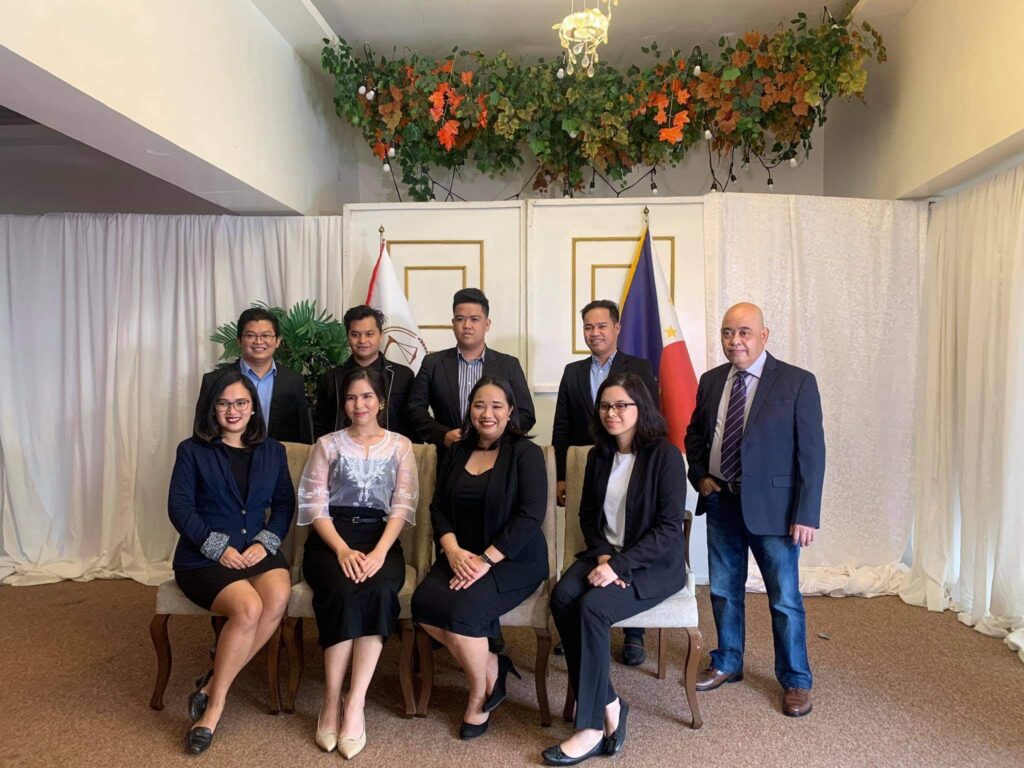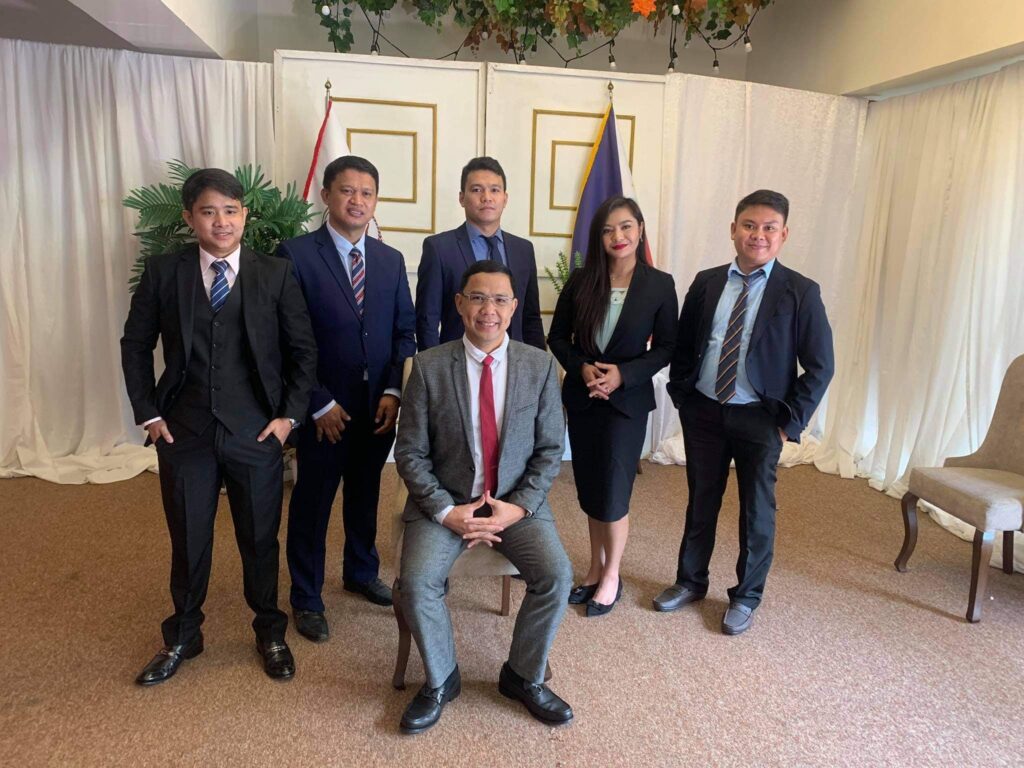Text by Henrylito D. Tacio
Photos courtesy of Atty. Israelito Torreon
It all started as Torreon Law Firm in May 2000 but was later changed to the Law Firm of Torreon and Partners in July 2013. Since its humble beginnings, the law firm has gone a long, long way.
The firm has handled varied cases – ranging from simple to controversial. For one, there was the unlawful detainer case that ran for ten years by the time it reached the Supreme Court.
“The opponent was a huge local corporation and we were representing a family of farmers who were in occupation of a tract of land even before the Japanese occupation,” recalled Atty. Israelito Torreon, the founding partner and dean of the Law School Department at Jose Maria College, of the pro bono case. “We were able to prove our client’s better right and superior title to the land despite absence of a physical land title by citing their Open, Continuous, Exclusive and Notorious possession of the land in the concept of an owner for more than 30 years. The Supreme Court upheld our position.”
Another case involved the constitutionality of the Memorandum of Agreement on the Ancestral Domain aspect (MOA-AD) between the government and the Moro Islamic Liberation Front (MILF), which was declared unconstitutional.
“In upholding our position, the Supreme Court said that there was a failure to consult local government units or communities which amounted to a departure from the government’s mandate under Executive Order No. 3,” Atty. Torreon said, explaining that EO No. 3 defined the authority of the GRP (Government of the Republic of the Philippines) Peace Panel.
Still, another is the ongoing case involving the indigenous peoples of Malalag, Davao del Sur. “(This) is actually the first test case of Republic Act 8371 (Indigenous People’s Rights Act of 1997),” he pointed out.
When he started the Firm, he had only two associates. But over the years, several lawyers joined the Firm, who eventually set up their own practice while others joined more established law offices. Others ventured into government service.

Law Firm of Torreon and Partners 
Atty Israelito Torreon (sitting) and partners
Currently, he has two law partners: Atty. Allan C. Lozare, his Senior Partner and Atty. Resci Angelli R. Rizada, his Managing Partner. Atty. Lozare, with whom he had been together for more than a decade, is an elected municipal councilor in Antipas, North Cotabato, and a professor at the Jose Maria College of Law. Atty. Rizada, a popular media personality, is the Assistant Dean of the Jose Maria College of Law, where she also teaches.
The associates in the Firm are Attorneys Alain Jan Brigoli, Jamel Agantal, and Bryan Arias (all graduates from the Ateneo de Davao Law School), and Eric John Cabuslay (from the Cor Jesu Law School).
Right now, there are six paralegals who handle legal research work, client interviews, and drafting pleadings, contracts, and conveyances. The Firm has five legal staff who are tasked with file management, billing, and serving of all legal documents and papers.
The Firm is located on the Second Floor of the Davao VIP Lounge along Gov. Duterte St. in downtown Davao City. Three rooms on the second floor are occupied by the firm, with still another office in the ground floor annex.
Last year, Atty. Torreon expanded his law practice by establishing an office in Quezon City. It is located at Unit 301, Heart of the City Condominium, South Triangle in Diliman, Quezon City. His Partner is Atty. Benito Dangazo of the San Beda College of Law. The Associates are Atty. Sarah Francisco and Atty. Stephen Gayados, who also both graduated from the San Beda College of Law.
“We are essentially into general law practice,” Atty. Torreon said. “But we strive to be the best in all areas of the law.”
The Firm was not an overnight success, though. Along the way, there were hardships and struggles to contend with.
“There is always that challenge of gaining the trust of clients,” he admitted. “Since the lawyer-client relationship is fiduciary in nature (based on trust), very few clients would entrust their problems to a new lawyer. I was barely 3 years in law practice when I decided to set up my own law practice.”
For another, there’s the problem of familiarity with real-life legal situations. “(This) is essentially dictated by a lawyer’s long experience in actual practice,” Atty. Torreon said. “I was lucky to have maintained good relations with more experienced lawyers who unselfishly provided me with insight and guidance as I navigated through the complex world of trial practice.”
But the biggest challenge was – and still is – financial matters. “Like most new private law practitioners, money to set up a decent office is always the perennial problem,” he said. “This will explain why many new lawyers would not venture into private practice right away. You have to invest in a modest office space, paid staff (a secretary or messenger or both), furniture and fixtures, books and computers to name a few.”
Those obstacles were encountered during the beginning of the Firm. Through the years, it has faced several other challenges.
“The practice of law is essentially service to the public,” Atty. Torreon said. “But we have to remain relevant and financially viable to support the people who run the Firm. Remaining relevant means your Core Team should be abreast with changes taking shape within the legal community. Lawyering is not easy so dedication to do the job without hesitation is the key. The lawyers should have the correct attitude and mindset and a heart for the less fortunate members of our community. Our law practice is not exclusively for those who can afford to pay our services. We also litigate pro bono as a way of showing our gratitude to the community who has supported us over the decades.”
According to Atty. Torreon, many people do not understand that the involvement of lawyers in the litigation of cases is purely professional, that is, affording the best legal service possible.
“It is never personal,” he explained. “Yet, an opposing party tends to see it differently such that if his side is not favored after a fair and impartial trial, he gets back at the lawyer. So, personal security becomes a problem for the lawyer.”
On the financial side, talking from experience, he said that some clients do not keep their end of the bargain; their signed Contract of Legal Services notwithstanding.
“There are times a client forgets to pay for services rendered,” Atty. Torreon said. “This is sometimes true if he fails to obtain a favorable judgment. But it must be remembered that it is not the lawyer who sits in judgment. Our job is limited to presenting a client’s case based on the available evidence and invoking the law applicable to that evidence. Magic is definitely not part of our training.”
The Firm, now on its more than two decades of dedicated service, is a fruition of a dream when he was still a boy growing up in Bansalan, Davao del Sur.
“Being a lawyer had always been my cherished dream,” he disclosed. “When I was growing up, I personally witnessed forms of injustices being perpetuated on different people, the marginalized especially. There were instances of people being disturbed in the ownership of their property, people being duped into signing contracts the terms of which they were made to believe would favor them, people getting involved in crime out of force of circumstances. The list is almost endless.”
Those incidents drove him to pursue his dream of becoming a lawyer. He has always romanticized the late Pres. Ramon Magsaysay’s statement which has been his guiding principle to this day: “Those who have less in life should have more in law.”
Atty. Torreon also comes from a huge family. “I have many relatives and many more of them come to me for all sorts of legal problems,” he said. “Can you imagine if there was no lawyer in the family to protect them?”
Atty. Torreon finished his Political Science from the University of Philippines in the Visayas. However, his Bachelor of Laws was obtained from the Ateneo de Davao University Law School. He got his Master of Laws from the San Beda College of Law. He also qualified for a scholarship for his second Master of Laws degree from the Nalsar University of Law in Hyderabad, Telangana, India. Likewise, he also finished a course in Introduction to U.S. Laws from the George Washington University, Institute for U.S. Law.
He was about 29 years old when he ventured to start his own law practice. “It was not easy, but there was not an instance where I entertained the thought of giving up,” he admitted. “The more difficult the situation was, the more I was motivated to succeed.
“Challenges and hardships have always been constant items in my life,” he continued. “Even as a budding law student, I had to put up with a shortage of funds, books and other materials which were all necessary to survive in the jungle that was law school. But this never deterred me. I prevailed in the end.”
Now 50, he said there are many more he wishes to attain. “To me, no case is too small that I cannot spare the required time and effort to accomplish a positive result for the client,” he said. “When I eventually retire some years from now, I just want to be remembered as the lawyer who never tired of exploring all possibilities for his clients no matter how difficult or frustrating the case may be. That, to me, is an accomplishment in itself.”
Life, someone said, is what we make it. The same is true with the Firm he established. “Our law firm has evolved over the years,” he said. “Our long years in trial practice make us the ideal venue for pursuing a career as a law practitioner. For those still aspiring to become lawyers, the litigation work that we do provides actual, hands-on training that will be very useful once they pass the bar and get admitted to the practice of law.”
Atty. Torreon is committed to making law practice public service. “My experience as a lawyer has taught me that because of his special skill, he is in a strategic position to influence changes in the society,” he pointed out. “The lawyer must always be mindful of this fact and should therefore remain true to his mandate of only doing the greatest good for the greatest number.”

